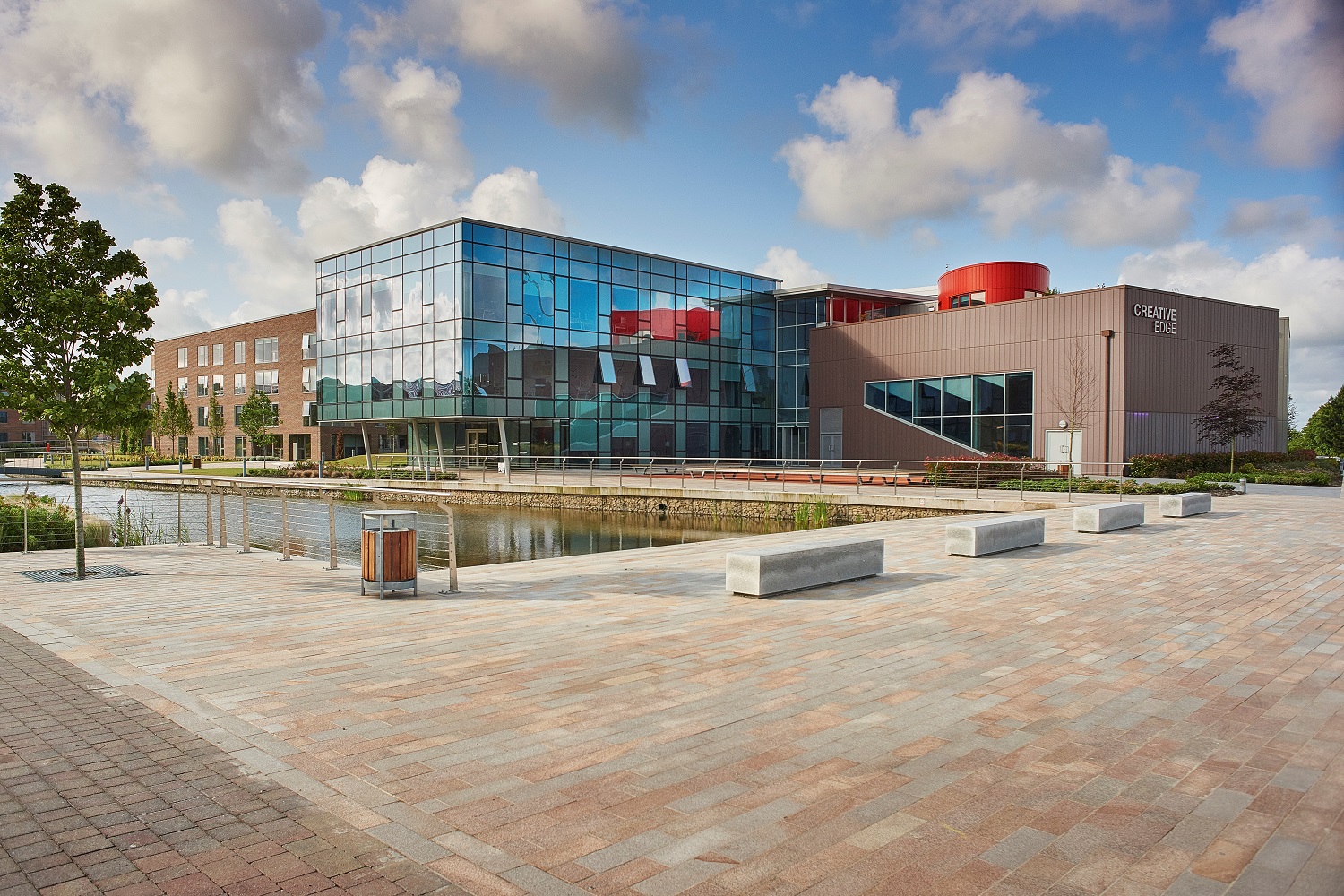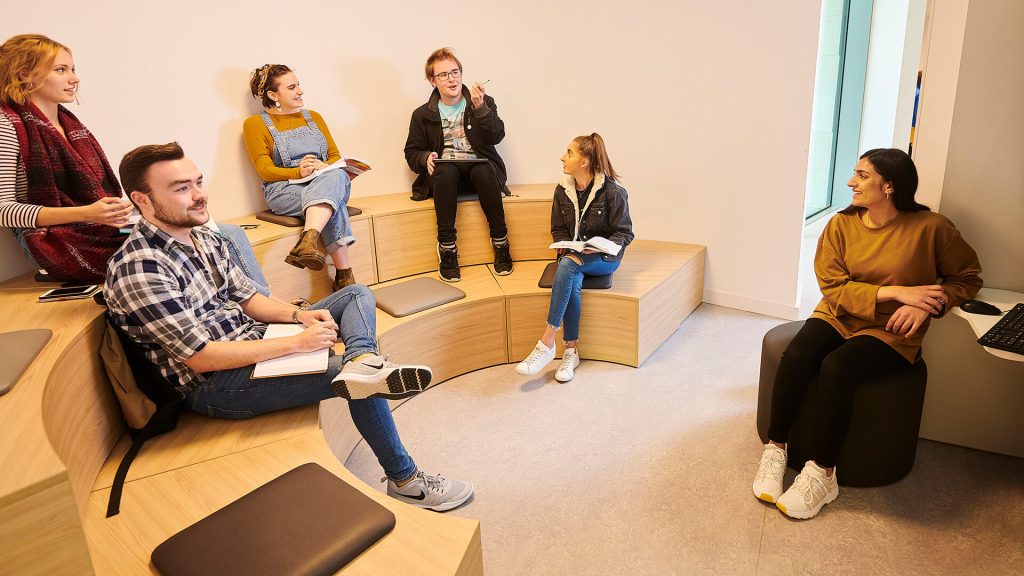English Language BA (Hons)
UCAS code: Q140
The English language constantly evolves, with words like gaslighting, permacrisis and influencer all recently shortlisted for word of the year. Explore its different forms, its history and how to communicate effectively. Become a specialist in the structure, application and linguistic analysis of this global language.
Overview
| Course length: | 3 years full-time 6 years part-time |
|---|---|
| Start dates: | September 2024 September 2025 |
| Location: | Edge Hill University |
| Example offers: | BBC-BBB (A Level) or DMM (BTEC) View full entry criteria |
| Subject(s): | English |
| Faculty: | Arts and Sciences |
| Department: | English and Creative Arts |

Explore how language shapes identity. Discover how it’s used by different groups of people and in different situations. Investigate how conversations and written texts are organised.
Our English language degree explores all aspects of spoken and written English. You’ll take a closer look at its forms and uses. We’ll present insights into how the language adapts and evolves, in how it’s used and what it’s used for.
You’ll shape your learning with optional modules in Years 2 and 3, ranging from the language of Shakespeare to forensic linguistics. In your final year you’ll have the option to complete a dissertation on an area of the English language and linguistics that interests you.
During this course, you’ll develop skills in collecting, transcribing and analysing data, and representing and interpreting results. We’ll guide your linguistic research projects to boost your confidence in observation, analysis and critical thinking.
Course features
-
International students can apply
-
Learn a language option available
-
Sandwich year option available
-
Studying abroad option available
What you'll study
Your first year will set the foundation of your learning. We’ll cover the key aspects of language and linguistics, such as structure, vocabulary and language diversity. Our core modules introduce you to the analysis and descriptive skills you’ll use throughout your time at Edge Hill. You’ll explore how English is used to make meaning and develop an awareness of the links between language and society.
In Year 2 you’ll select six optional modules, with at least two chosen from: History and Development of English, Analysing Discourse, Child Language Development or English Language: Forms and Contexts. You’ll have the opportunity to choose a specific topic of the English language to investigate, such as language and gender or the use of language in the media, or undertake an independent project working with an external organisation. This year further encourages your graduate skills, such as problem-solving, creative and innovative thinking, and resilience and self-belief.
In the final year of your English Language degree, you’ll deepen your linguistic knowledge and expand your range of skills. Our specialist modules allow you to see how language and linguistics are employed in everyday life, for example in the classroom, in the courtroom and in the media. You can choose to examine the influences of other languages on English, or how language is perceived, processed and understood. You can explore how to teach English to speakers of other languages, or discover more about how language is used to communicate and construct gender, sexual and other social identities. You can also use your practical and analytical skills by completing a dissertation and other research-based written projects
Optional modules provide an element of choice within the course curriculum. The availability of optional modules may vary from year to year and will be subject to minimum student numbers being achieved. This means that the availability of specific optional modules cannot be guaranteed. Optional module selection may also be affected by timetabling requirements. Some restrictions on optional module choice or combinations of optional modules may apply. In addition to the optional module choices listed, it may also be possible to apply to study an alternative 20-credit module in Year 2 and/or Year 3, chosen from outside the course curriculum. Some restrictions on this elective module choice may apply.
How you'll study
Teaching and learning activities vary depending on the module, so sometimes you’ll encounter lectures, practical demonstrations, and seminar-based learning, and other times you’ll have workshops or student-led presentations, independent research projects and group activities. Our virtual learning environment will also give you access to extensive online resources which will support your learning throughout your three years. In all modules of English language and linguistics, you’ll benefit from our support and guidance to help you achieve your best work.
How you'll be assessed
Assessment involves a mixture of coursework and formal tests or examinations. Most emphasis is placed on work produced in your own time or formally presented in class. Typically, assessment will take the form of essays, linguistic analyses and reports, class tests, individual/group presentations and group work. You will also have the opportunity to work independently on projects supporting your future career development.
Who will be teaching you
You’ll be taught by a group of dedicated and enthusiastic tutors who are experts in their field. They teach English Language and linguistics at undergraduate and postgraduate level and also publish books, edit and contribute to academic journals and present their research at international conferences. They are committed to providing students with an excellent learning experience and update modules regularly to ensure that they are current and relevant. You’ll be carefully guided by your lecturers throughout your studies.
Entry criteria
Entry requirements
Typical offer 112-120 UCAS Tariff points. No specific subjects are required.
Example offers
| Qualification | Requirement |
|---|---|
| A Level | BBC-BBB. |
| BTEC Extended Diploma (or combination of BTEC QCF qualifications) | Distinction, Merit, Merit (DMM). |
| T Level | Overall grade of Merit. |
| International Baccalaureate (IB) | We are happy to accept IB qualifications which achieve the required number of UCAS Tariff points. Subject-specific requirements at Higher Level (HL) Grade 5 may apply. |
| Access to Higher Education Diploma | 45 credits at Level 3, for example 15 credits at Distinction and 30 credits at Merit or 24 credits at Distinction and 21 credits at Merit. The required total can be attained from various credit combinations. |
Please note, the above examples may differ from actual offers made. A combination of A Level and BTEC awards may also be accepted.
If you have a minimum of two A Levels (or equivalent), there is no maximum number of qualifications that we will accept UCAS points from. This includes additional qualifications such as Extended Project Qualification (EPQ), AS Levels that haven't been continued to A Level, and General Studies AS or A Level awards.
English language requirements
International students require IELTS 6.0, with a score no lower than 5.5 in each individual component, or an equivalent English language qualification.
If your current level of English is half a band, one band, or one-and-a-half bands lower, either overall or in one or two elements, you may want to consider our Pre-Sessional English course.
How to apply
Apply full-time
Read our guide to applying through UCAS to find out more about the application process.
International
Please see our international student pages for further information about how to apply as a prospective international student.
Part-time applications require a direct application to Edge Hill. Please select the year of entry that you wish to apply for.
Should you accept an offer of a place to study with us and formally enrol as a student, you will be subject to the provisions of the regulations, rules, codes, conditions and policies which apply to our students. These are available at www.edgehill.ac.uk/studentterms.
If you join a full time undergraduate degree at Edge Hill University, we will guarantee you the offer of a room in our halls of residence for the first year of your course.
Discover our accommodation
Facilities
 The Department of English and Creative Arts is based in Creative Edge, a state-of-the-art £17million building offering highly contemporary facilities.
The Department of English and Creative Arts is based in Creative Edge, a state-of-the-art £17million building offering highly contemporary facilities.
The £17 million Creative Edge building features a lecture theatre, seminar rooms, IT facilities and smaller tutorial spaces. It has everything you need to become a capable, versatile, creative writer and thinker. Creative Edge’s social learning spaces are ideal for passionate discussion with like-minded creatives.
You’ll develop the practical skills, analytical tools and confidence for wherever your creative flair and insight takes you.
Where you'll study
Creative Edge
Finance
Tuition fees
UK Full-Time
£9,250
a year
UK Part-Time
£77 per credit
for 360 credits
International
£16,500
a year
EU/EEA and Swiss students who have settled or pre-settled status under the EU Settlement Scheme, as well as Irish nationals, may be eligible for the UK tuition fee rate.
Financial support
Subject to eligibility, UK students joining this course can apply for a Tuition Fee Loan from the Government to cover the full cost of tuition fees. UK students enrolling on the course may also be eligible to apply for additional funding to help with living costs.
Please view the relevant Money Matters guide for comprehensive information about the financial support available to eligible UK students.
EU/EEA and Swiss students who have settled or pre-settled status under the EU Settlement Scheme may be eligible to apply for financial support. Irish nationals can ordinarily apply to Student Universal Support Ireland (SUSI). If you are an EU student who does not have settled or pre-settled status, or are an international student from a non-EU country, please see our international student finance pages.
Your future career
Our English language degree teaches skills that are transferable across a diverse range of career paths. English Language graduates gain a knowledge base that would be useful for graduate roles in:
- marketing, advertising and social media
- editing, publishing and lexicography
- journalism
- public and voluntary sectors
- teaching*
- speech and language therapy*
- human resources
- travel, tourism and hospitality
- business management and consultancy
- law*
* Further training required.
We’ve seen some of our graduates taking their studies further and going on to complete a Masters or PhD, while others have gone on to roles such as:
- Communications assistant
- Whole school literacy coordinator
- Recruitment consultant
- Talent coordinator
- Senior production editor
- Director of a language school
Our graduates are trained to be excellent communicators, critical thinkers and innovative problem-solvers. The English Language degree is a great foundation for graduate work in a wide range of industries and positions.
Course changes
Every effort has been made to ensure the accuracy of this information, however our courses are subject to ongoing review and development. Changing circumstances may necessitate alteration to, or the cancellation of, courses.
Changes may be necessary to comply with the requirements of professional bodies, revisions to subject benchmarks statements, to keep courses updated and contemporary, or as a result of student feedback. We reserve the right to make variations if we consider such action to be necessary or in the best interests of students.











